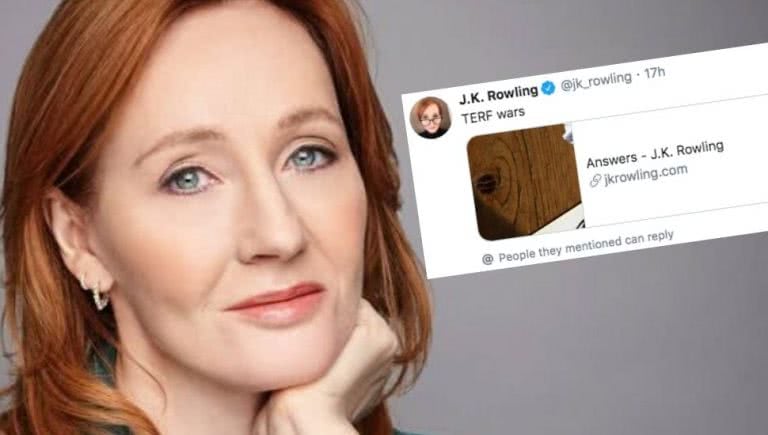TRIGGER WARNING This article or section, or pages it links to, contains information about sexual assault and/or violence which may be triggering to survivors.
Days after Harry Potter author J.K. Rowling came under fire for posting “transphobic” tweets, the 54-year-old has defended her stance in a lengthy essay posted to her website.
ICYMI, the Brit caused a major stir across Twitter on Saturday after she retweeted an article titled: “Creating a more equal post-COVID-19 world for people who menstruate.”
She captioned her retweet: “‘People who menstruate.’ I’m sure there used to be a word for those people. Someone help me out. Wumben? Wimpund? Woomud?”
As you can guess, her anti-trans rhetoric did not go down well with the Twitterverse (or many other living in 2020, for that matter).
After several prominent artists, writers and even stars of the Harry Potter film franchise spoke out publically denouncing the author’s comments, Rowling felt compelled to “explain [herself] on an issue surrounded by toxicity” in a 3,600-word essay.
In the lengthy post, Rowling attempted to clarify her concerns around single-sex spaces by revealing she was a survivor of abuse.
Love Music?
Get your daily dose of metal, rock, indie, pop, and everything else in between.
Rowling went on to describe a “violent” marriage with her first husband, a Portuguese journalist named Jorge Arantes who she briefly married in 1992, as well as a serious sexual assault that happened in her 20s.
“I’m mentioning these things now not in an attempt to garner sympathy, but out of solidarity with the huge numbers of women who have histories like mine, who’ve been slurred as bigots for having concerns around single-sex spaces,” she wrote.
Rowling added that the backlash had left her “in a very dark place inside my head, as memories of a serious sexual assault I suffered in my 20s recurred on a loop. That assault happened at a time and in a space where I was vulnerable, and a man capitalised on an opportunity. I couldn’t shut out those memories and I was finding it hard to contain my anger and disappointment about the way I believe my government is playing fast and loose with women’s and girls’ safety.”
Despite the attempted explanation, many continued to shame Rowling by slamming the essay as “unsubstantiated“, as well as noting that Rowling seems to be “conflating trans rights with Donald Trump, incels and pornography” as well as insinuating being trans was a byproduct of mental illness.
“The writings of young trans men reveal a group of notably sensitive and clever people,” she continued in the statement.
“The more of their accounts of gender dysphoria I’ve read, with their insightful descriptions of anxiety, dissociation, eating disorders, self-harm and self-hatred, the more I’ve wondered whether, if I’d been born 30 years later, I too might have tried to transition.
She continued, “The allure of escaping womanhood would have been huge. I struggled with severe OCD as a teenager.
“If I’d found community and sympathy online that I couldn’t find in my immediate environment, I believe I could have been persuaded to turn myself into the son my father had openly said he’d have preferred.”
Following Rowling posting the essay, Harry Potter star Emma Watson gave her unwavering support to her trans fans and their community via Twitter.
“Trans people are who they say they are and deserve to live their lives without being constantly questioned or told they aren’t who they say they are,” Watson declared.
“I want my trans followers to know that I and so many other people around the world see you, respect you and love you for who you are.”


































